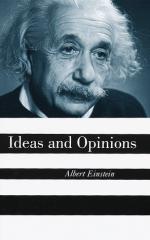|
This section contains 654 words (approx. 2 pages at 400 words per page) |

|
Part 1, pp. 28-80 Summary and Analysis
Part 1 examines three subjects, freedom, religion, and education, and addresses seven friends. "On Academic Freedom" (1931) defends Professor E. J. Gumbel, calling on people to read him with open minds. In "Fascism and Science" (1934), Einstein invokes the Italian Renaissance and claims pure scientific research is sacred. "On Freedom" (1940) takes for granted that people should labor as little as possible to maintain life and health and concentrate on their intellectual and artistic powers.
The next two items examine the House Un-American Activities Committee's "Modern Inquisitional Methods" and advocates Gandhi's "non-cooperation". In "Human Rights" (1954), he declares that the struggle for human rights is eternal. "About Religion" contains longer treatises. "Religion and Science" (1930) holds that humans act and think to satisfy needs and avoid pain. In "The Religious Spirit of Science" (1934), he claims that all profound scientists are religious, but not...
(read more from the Part 1, pp. 28-80 Summary)
|
This section contains 654 words (approx. 2 pages at 400 words per page) |

|




